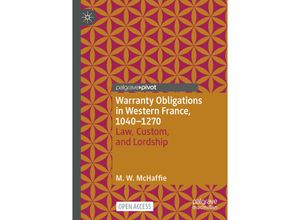This open access book examines warranty obligations in western France during the central Middle
Ages. Warranty refers to the commitments that an individual undertook when alienating property
to protect the transfer from outside challenge and to provide compensation if they failed to
defend a transaction successfully. The subject has never received a full-length study before
meaning that scholars' interpretation of warranty is marred by a number of untested
generalisations. Warranty has generally only been viewed as a thirteenth-century development
owing to the influence of Roman law and changes in family structure. This book therefore
considers the evidence for warranty in western France en masse starting with the first
appearance of warranty clauses in documents in the 1040s up until the compilation of vernacular
lawbooks in the 1270s. This book opens a window onto legal practice in the central Middle Ages
raising questions about wider processes of legal change. It emphasises the importance of
lordship in particular when it comes to making sense of how and why warranty obligations
developed the way they did. It thus challenges the prevailing explanatory narratives invoked by
scholars when discussing warranty and invites us to ask questions about the sorts of stories
we tell when looking at legal change. Combining documentary and prescriptive lawbooks along
with a rich corpus of case material this book offers a comprehensive account of a
little-studied phenomenon one that can elucidate much larger interpretative questions that are
central to French legal history.



